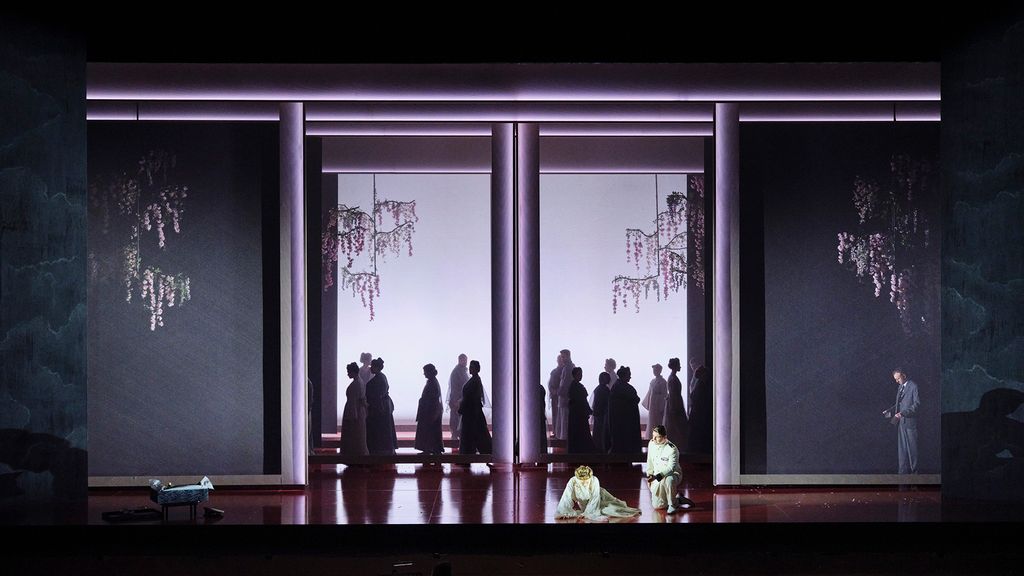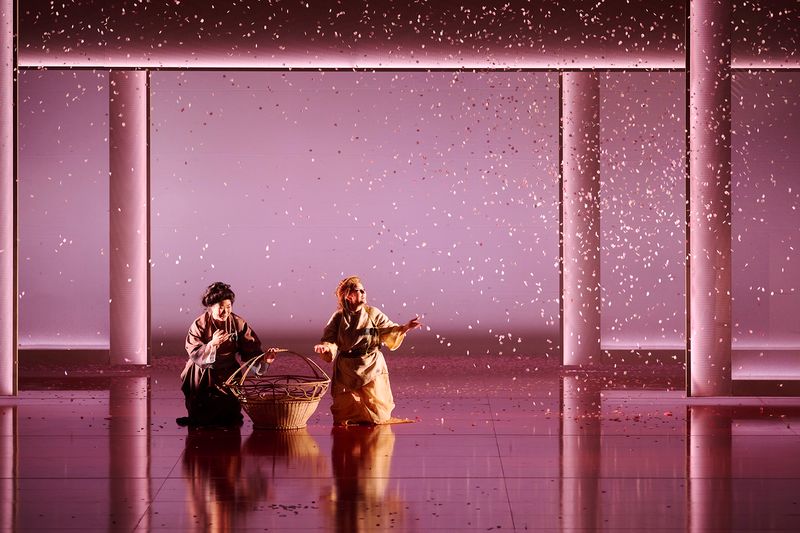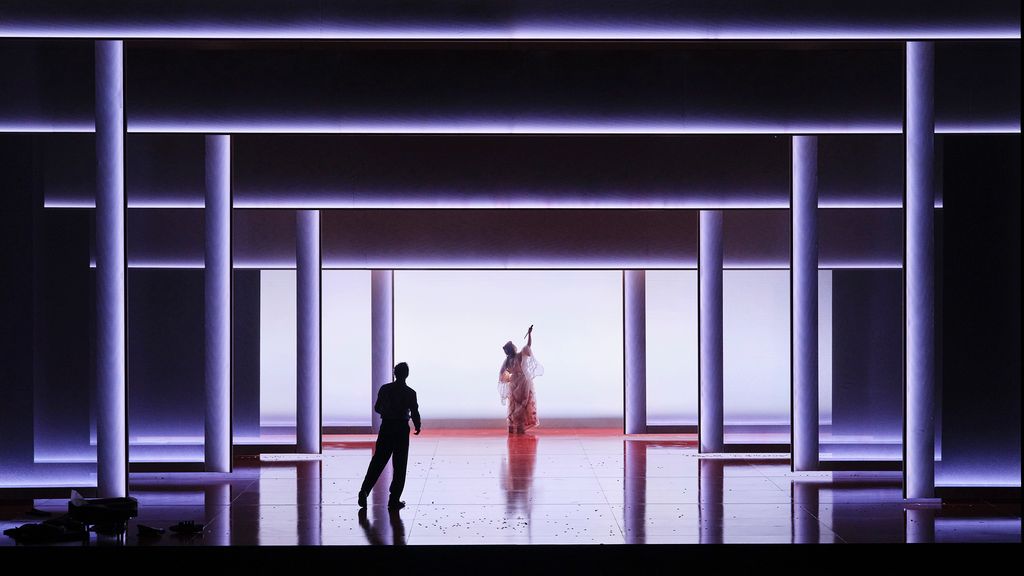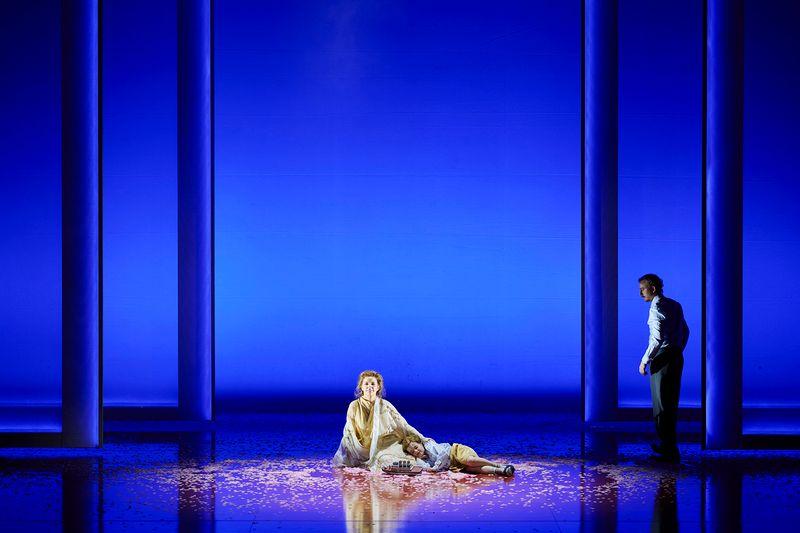Emotional truth backed up by musical sophistication is what saves Puccini’s drama about a geisha deserted by an American officer from mawkishness. Director Daisy Evans has a very good idea for getting at its palpitating heart in a production of stunning visual beauty; Celine Byrne in the title role gives us vocal opulence but not nearly enough identification with a woman whose total, misplaced love leads to painful hope and desperate tragedy.
A student who was at a Dublin discussion with Evans told me her essential concept, and I thought it sounded promising: at Pinkerton’s funeral many years later than Puccini’s ending, his wife Kate allows his son by Butterfly, whom she’s brought up as their own, to find out the truth about his origins through a suitcase of vital clues. The son then moves through the fatal past, and meets his three-year-old self. I wonder how many others in the audience got it, though: my neighbour didn’t, by the time of the interval. Still, I found it made for many emotional turns of the screw lacking in Byrne’s characterisation. You have to accept an auburn-haired Butterfly whose coiffure seems more that of an Edwardian society lady, and Byrne doesn’t do much as the 15-year-old Butterfly of Act One to work against that (pictured above in the foreground with Otar Jorjikia's Pinkerton, Michael Mullen as her grown-up son right). True, it’s a tall order for any soprano with the strength (which means maturity) for the role – if Butterfly ever looked 15, we’d be horrified by very resonant American child abuse – but Act Two, which revolves around the waiting woman of three years later, her delusional raptures and her fear, doesn’t quite resolve the issue either, despite a few impressive lashings-out. The other part of the problem is that though Byrne’s voice is very beautiful in colour, it doesn’t change hue. So the best things are the radiance in the love duet – where, oddly, Butterfly keeps disrobing even when she tells Pinkerton how delicate and shy she is – and the full-throttle top notes.
You have to accept an auburn-haired Butterfly whose coiffure seems more that of an Edwardian society lady, and Byrne doesn’t do much as the 15-year-old Butterfly of Act One to work against that (pictured above in the foreground with Otar Jorjikia's Pinkerton, Michael Mullen as her grown-up son right). True, it’s a tall order for any soprano with the strength (which means maturity) for the role – if Butterfly ever looked 15, we’d be horrified by very resonant American child abuse – but Act Two, which revolves around the waiting woman of three years later, her delusional raptures and her fear, doesn’t quite resolve the issue either, despite a few impressive lashings-out. The other part of the problem is that though Byrne’s voice is very beautiful in colour, it doesn’t change hue. So the best things are the radiance in the love duet – where, oddly, Butterfly keeps disrobing even when she tells Pinkerton how delicate and shy she is – and the full-throttle top notes.
Callow American Pinkerton is a tenor who sometimes has trouble getting up top and a wooden actor, Otar Jorjikia. Sympathetic consul Sharpless doesn’t make much of an impression either, though Iurii Samoilov’s baritone is handsome enough. That leaves Hyona Kim among the principals to convey heartbreak and humanity as Butterfly’s maid Suzuki: a world-class performance (Kim and Byrne pictured below in the Flower Duet).  Fortunately more emotion flows from the pit, where after a not-quite-vivid enough start, Fergus Sheil allows gorgeous expansiveness from the Irish National Opera Orchestra in the flow of melody and every detail in Puccini’s miraculously fine-tuned score to make its mark in the superbly alive Bord Gáis Energy Theatre acoustics. And the wounding comes on stage in the shape of Butterfly's grown-up son by Pinkerton (Michael Mullen) and his adoptive mother (Imelda Drumm) – who knows what name she gave young Sorrow? Perhaps she’s too omnipresent in the action, but the youth’s gradual understanding of his father’s cruelty is vital for this production.
Fortunately more emotion flows from the pit, where after a not-quite-vivid enough start, Fergus Sheil allows gorgeous expansiveness from the Irish National Opera Orchestra in the flow of melody and every detail in Puccini’s miraculously fine-tuned score to make its mark in the superbly alive Bord Gáis Energy Theatre acoustics. And the wounding comes on stage in the shape of Butterfly's grown-up son by Pinkerton (Michael Mullen) and his adoptive mother (Imelda Drumm) – who knows what name she gave young Sorrow? Perhaps she’s too omnipresent in the action, but the youth’s gradual understanding of his father’s cruelty is vital for this production.
His near-breakdown in the anguished Prelude to Act 3 moved me, likewise the idea that it’s he whom Butterfly faces before her suicide, as if seeing a potential for grown-up life she won’t live to witness (final scene pictured below). The child Sorrow is played with extraordinary poise by Ewan Gaster: you can forget puppetry pace Minghella when a real boy can pack such an emotional punch. Young Gaster had a whale of a time at the curtain call, too. Heightening the human figures in closed or open spaces, articulating the drama perfectly, are Kat Heath’s amazing but fundamentally simple sliding panels – I can’t remember a Butterfly since Graham Vick’s at English National Opera which used them so effectively – and Jake Wiltshire’s stunning changes of light. This is a design which works closely with Evans’ direction. If occasionally the figures within it are dehumanised, as at the Act One wedding, that’s a small price to pay for such careful stage composition. Production-wise, this is a Butterfly for the ages; it just needs a lead singer who lives the anguish.
Heightening the human figures in closed or open spaces, articulating the drama perfectly, are Kat Heath’s amazing but fundamentally simple sliding panels – I can’t remember a Butterfly since Graham Vick’s at English National Opera which used them so effectively – and Jake Wiltshire’s stunning changes of light. This is a design which works closely with Evans’ direction. If occasionally the figures within it are dehumanised, as at the Act One wedding, that’s a small price to pay for such careful stage composition. Production-wise, this is a Butterfly for the ages; it just needs a lead singer who lives the anguish.















Add comment